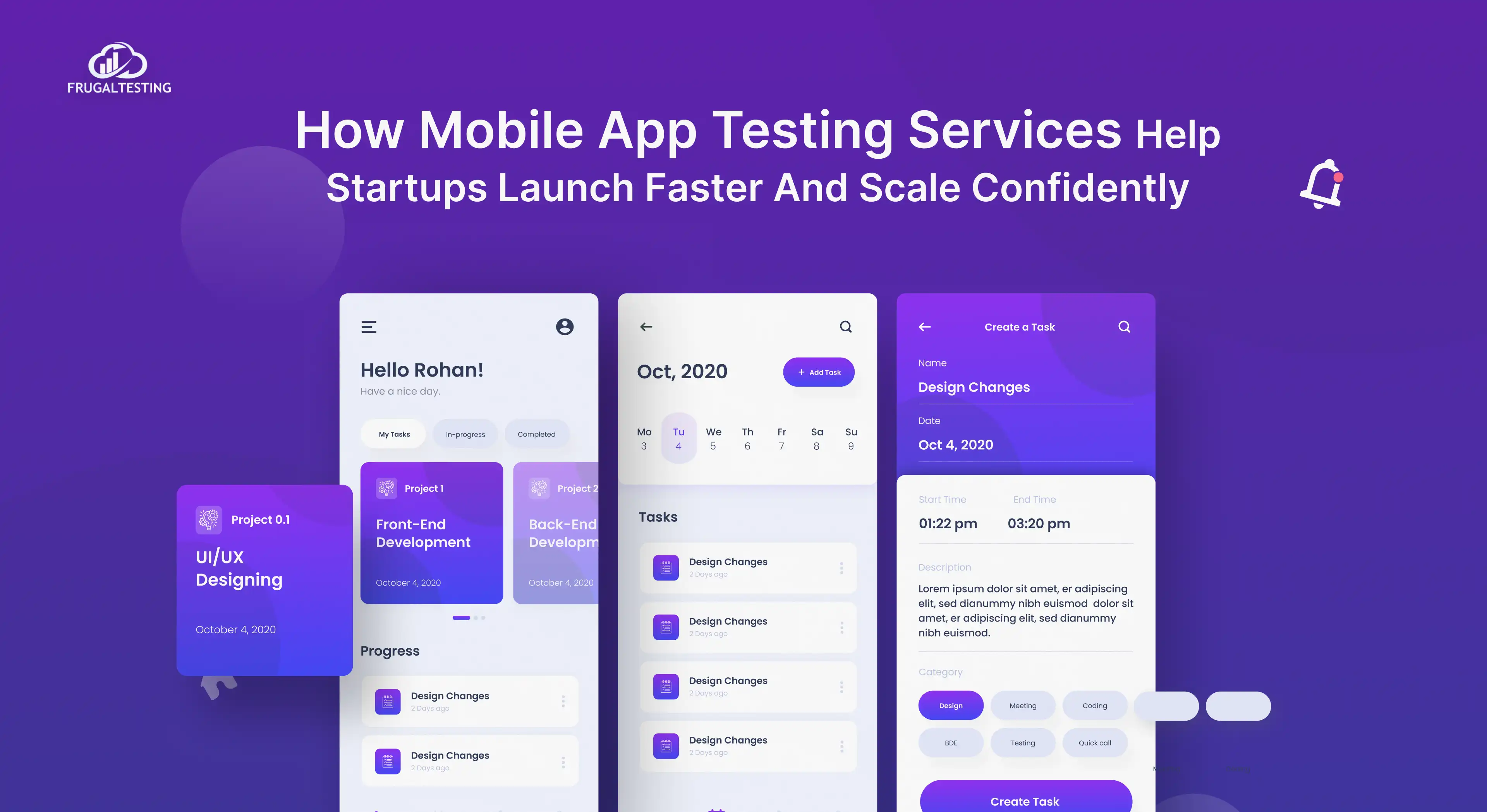In 2025, cloud-based testing is a key strategy for SaaS companies to deliver secure, scalable apps. With the rise of cloud computing and artificial intelligence, businesses now prefer cloud application platforms for flexibility, real-time reporting, and efficiency. This shift helps top SaaS companies perform performance testing, including load and performance testing, across global setups.
By using test automation tools, test automation frameworks, and cloud computing software, teams ensure faster releases and strong software quality. Features like cloud computing security, software testing and quality assurance services help identify potential issues early and improve customer satisfaction.
Tools offering codeless automation and support for all skill levels allow easier testing, making them the best choice for user interface validation. For leading SaaS companies, this approach, along with frequent updates, enables better insights, performance, and reliability.
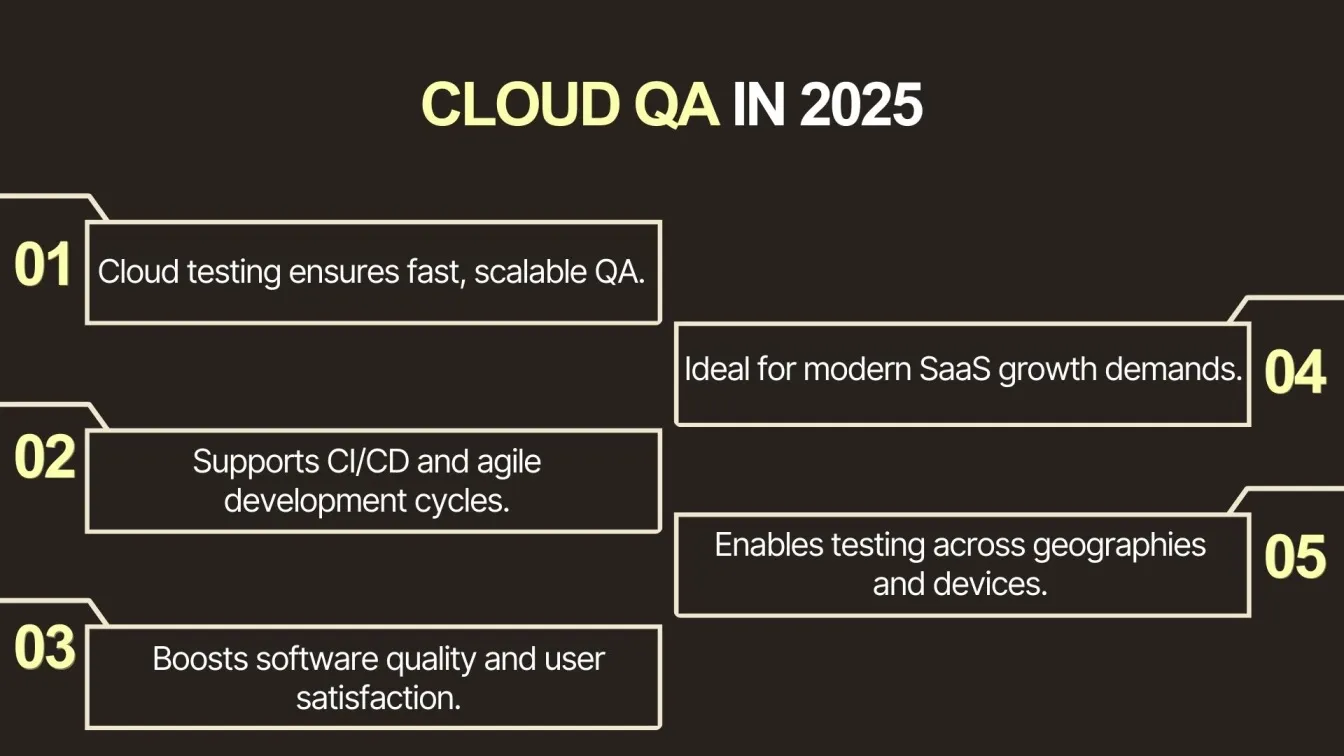
What’s next? Keep scrolling to find out:
🚀 Grasp the Basics: Discover how cloud-based testing enhances SaaS software quality.
🚀 Explore the Types: Dive into key testing types like functional, performance, and security.
🚀 Automate Smartly: Leverage advanced test automation tools for speed and accuracy.
🚀 Ensure Security: Protect sensitive data with robust cloud testing security measures.
🚀 Stay Future-Ready: Adapt to evolving trends with future-proof testing strategies.
Understanding Cloud-Based Testing in SaaS
Setting up test environments, managing infrastructure, and scaling test coverage can be time-consuming and costly for SaaS providers. That’s where cloud-based solutions come in-they streamline the entire process using powerful cloud services and cloud resources.
By executing tests in the cloud, SaaS companies can validate functionality, run performance testing, and ensure software quality across various browsers, devices, and networks—all without physical setups. These environments are provisioned on-demand via cloud communication computing platforms, ideal for agile and DevOps teams.
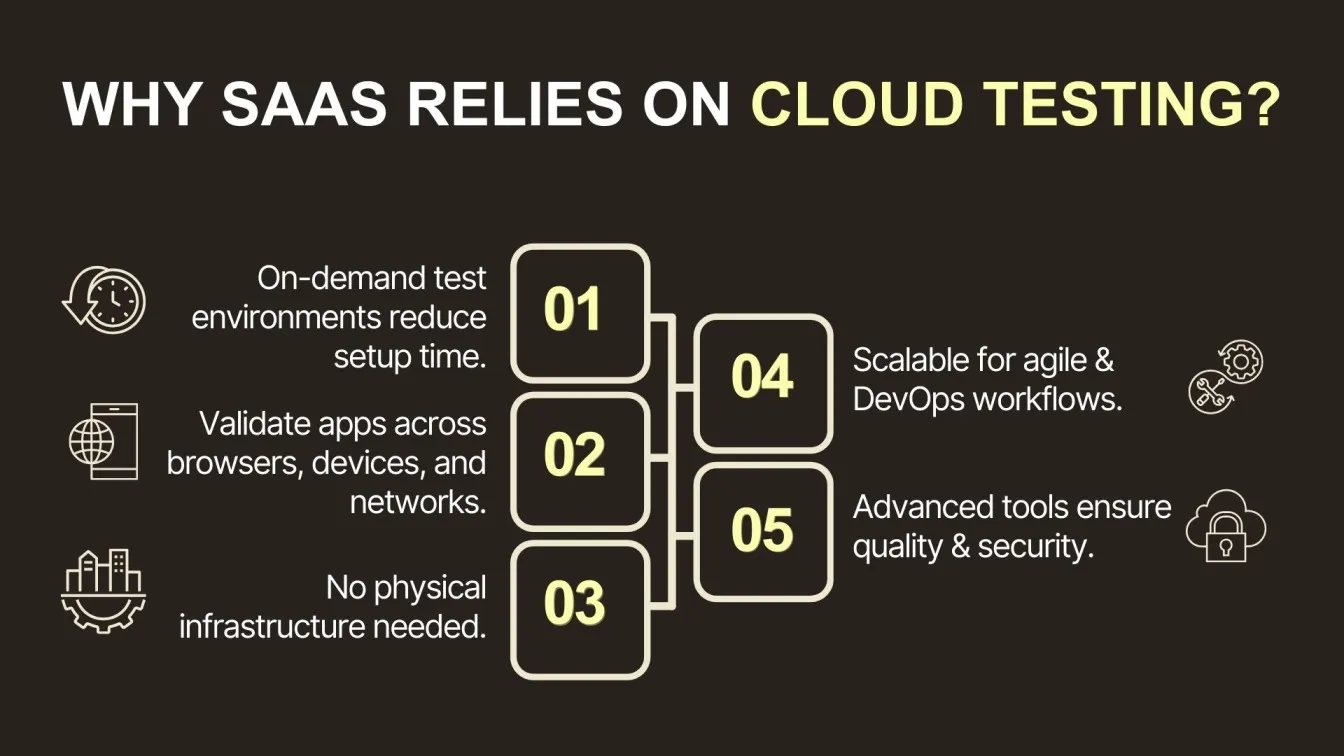
Cloud Automation Testing and Popular Tools highlight Standout features, tools for software quality, and dedicated security testing solutions available in today’s modern codeless platforms, overcoming notable challenges like initial setup, scalability of servers, and potential threats with advanced Technology Intelligence.
The Importance of Software Quality for SaaS Providers
As SaaS applications become central to modern digital operations, maintaining high software quality is no longer optional - it's a competitive necessity.

Why Software Quality Matters for SaaS Companies:
- Consistent User Experience: Leveraging advanced quality control software and quality assurance software helps teams detect bugs early, maintain cross-platform consistency, and ensure seamless application functions across various environments, enhancing a reliable user experience.
- Faster, Confident Releases: By incorporating software quality assurance services and software quality assurance testing services into the CI/CD pipeline, development teams can release features quickly without compromising reliability.
- Smarter Testing with Automation: Implementing testing automation with the help of a proven test automation platform and specialized test automation services reduces manual errors, speeds up test cycles, and increases overall productivity.
Key Features of Cloud-Based Testing Platforms
Cloud-based testing platforms empower SaaS companies to ensure faster, more reliable releases by offering flexible, scalable, and automation-ready environments. These platforms integrate seamlessly into modern development workflows, enhancing the efficiency of software quality assurance testing services.
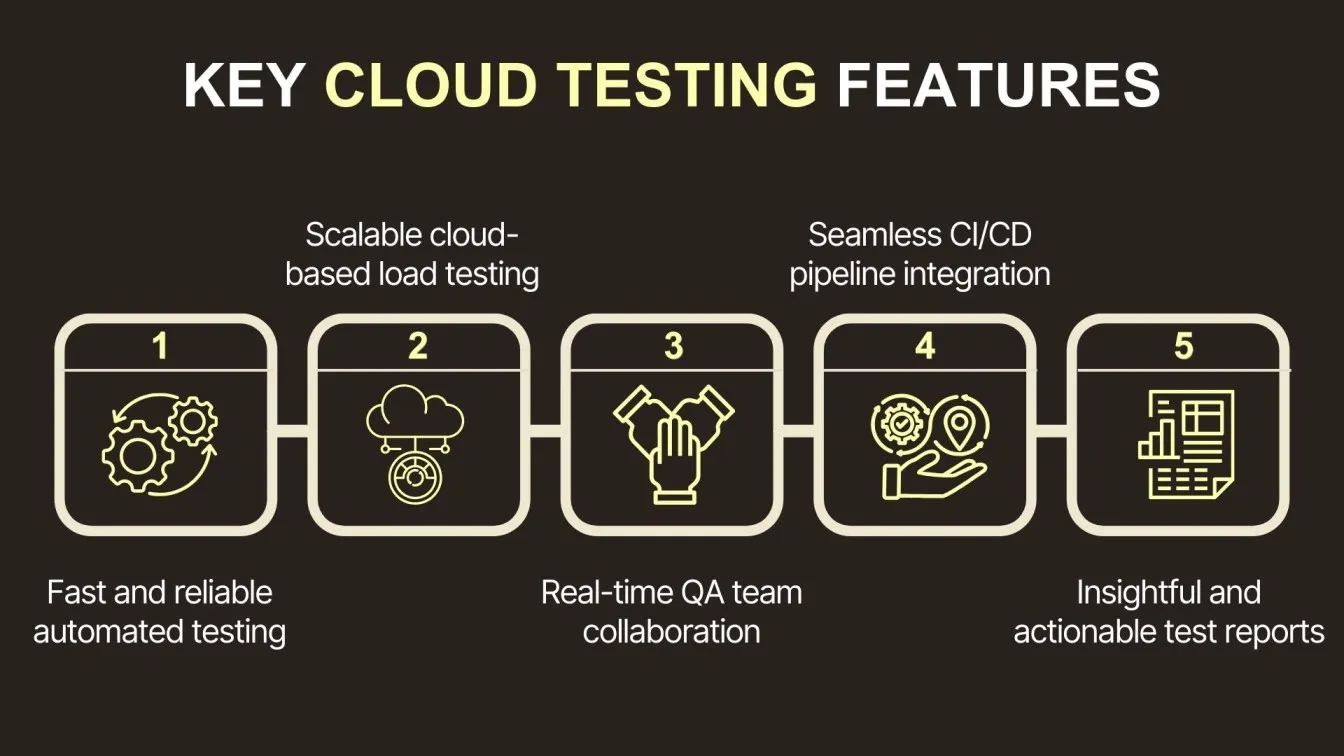
- Testing Automation: Utilizing powerful test automation platforms and test automation tools enables teams to automate repetitive testing tasks, speed up testing cycles, and reduce human error.
- Scalability on Demand: Cloud services and cloud resources can simulate heavy loads, enabling performance testing and load and performance testing for complex applications while addressing scalability concerns.
- Centralized Collaboration: Cloud-based automated testing allows distributed QA teams to collaborate in real time with simplified environment setup, no need for specialized skills, and testing on real browsers.
- Integrated Toolchain: Seamless integration with CI/CD pipelines allows for effective test management, continuous testing, and optimized delivery of testing web applications. Tools support bug tracking, management tools, and enterprise-level test management.
- Detailed Reporting & Analytics: Real-time dashboards and insights enable quick issue resolution while maintaining high standards with quality control software.
Types of Cloud-Based Testing for SaaS Applications
Cloud-based testing is essential for ensuring the quality and reliability of SaaS applications. Key types include:
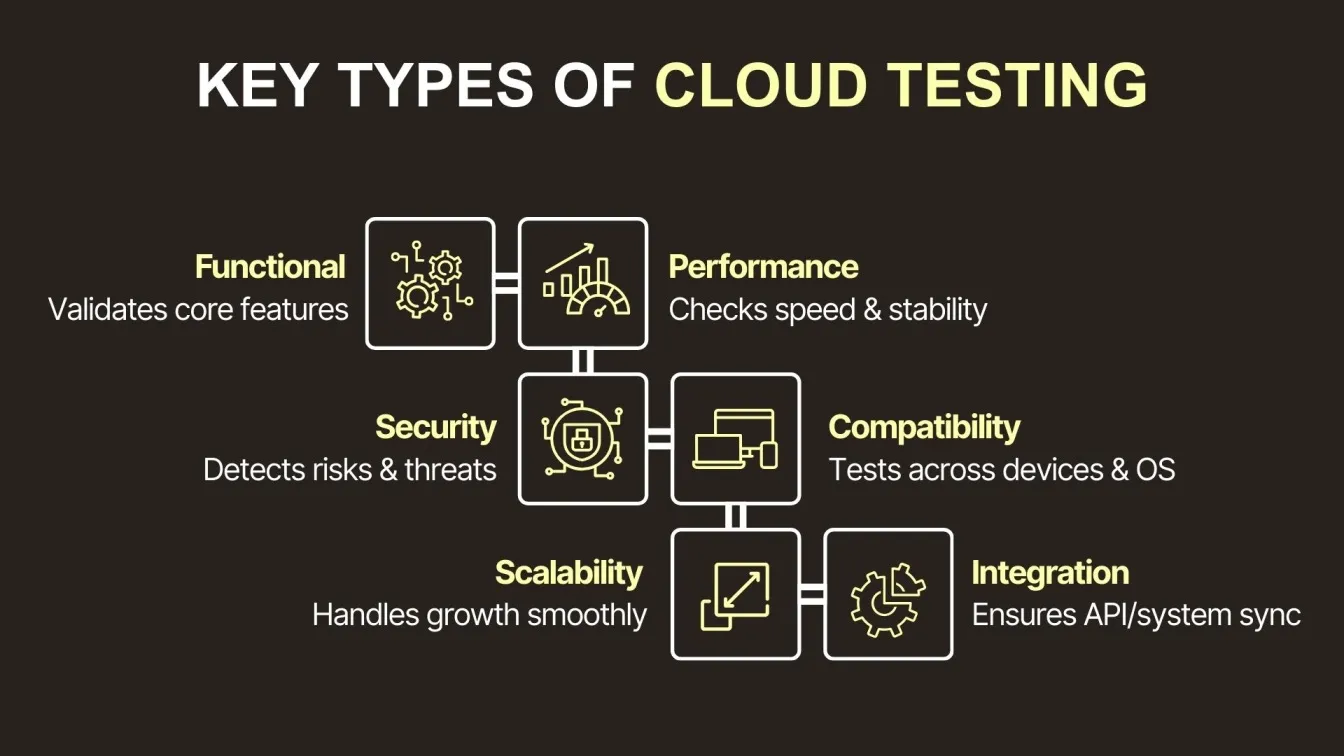
- Functional Testing: Ensures that all features of the SaaS application work as expected. By leveraging cloud platforms, testers can validate functionality across various environments efficiently.
- Performance Testing: Using cloud-based performance testing software and tools, teams can assess how the application performs under load and stress. This is crucial for testing performance during traffic spikes.
- Security Testing: With cloud computing security becoming a top priority, this testing type uncovers potential vulnerabilities and ensures compliance with standards.
- Compatibility Testing: Verifies smooth operation across different browsers, devices, and OS, using cloud environments to simulate diverse configurations.
- Scalability Testing: Checks if the application can scale with user demand in real-time cloud setups.
- Integration Testing: Ensures seamless communication between cloud-based SaaS apps and external APIs or systems.
Advantages of Cloud-Based Testing for SaaS Companies
Cloud-based testing offers SaaS companies a smarter, more efficient approach to maintaining application reliability and performance. It supports continuous delivery, scalability, and quicker time-to-market - all while ensuring strong software quality assurance services.
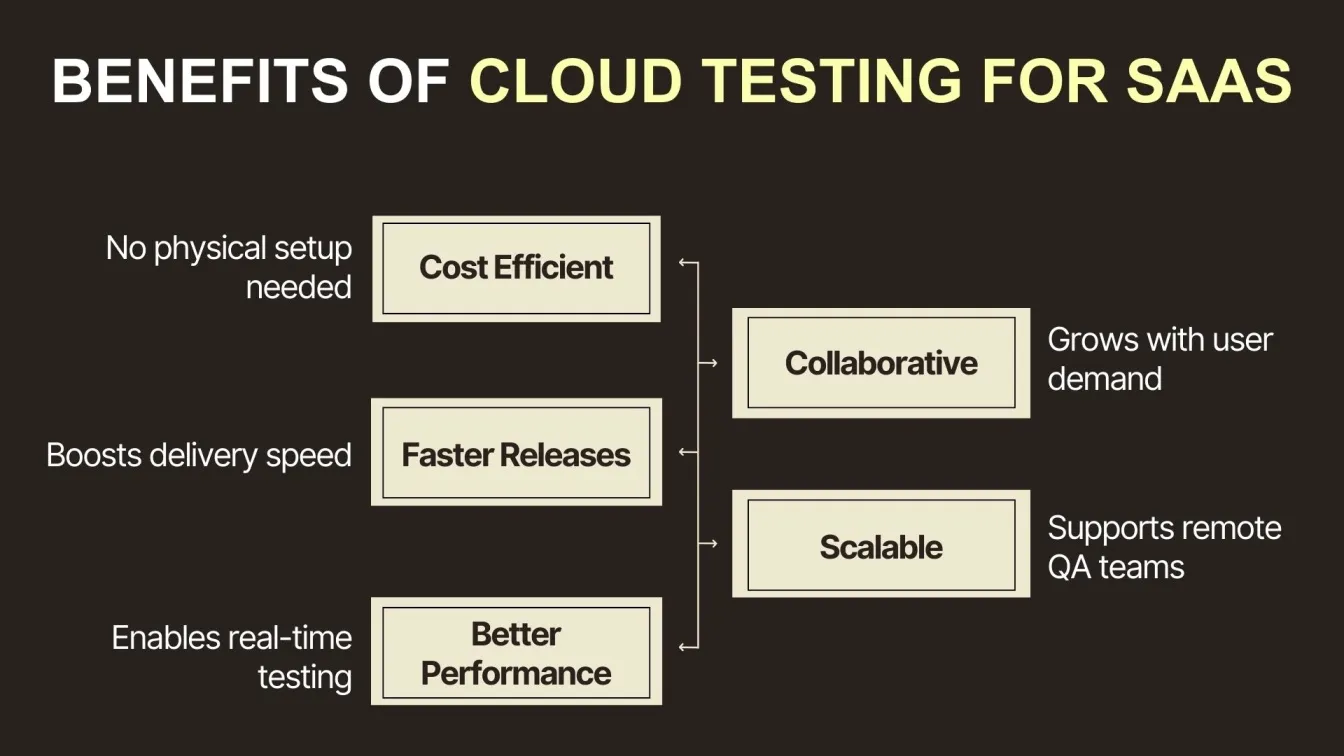
- Cost Efficiency: Eliminates the need for physical infrastructure, reducing overhead and making software quality assurance testing services more affordable and scalable.
- Faster Time-to-Market: With test automation services and testing automation capabilities, teams can release features and updates more quickly and confidently.
- Improved Testing Performance: Cloud environments allow parallel test execution and real-time monitoring, enhancing testing performance and response time diagnostics.
- Scalability and Flexibility: Resources scale automatically based on demand, making them ideal for load and performance testing software scenarios.
- Enhanced Collaboration: Teams can work from anywhere using centralized quality assurance software tools, enabling consistent communication and faster bug resolution - bringing significant cost savings and improving the overall testing process.
Overcoming Challenges in Cloud-Based Testing Implementation
Cloud-based testing offers speed and scalability, but SaaS companies can face key implementation challenges. Tackling these early improves the testing process and ensures better quality outcomes.
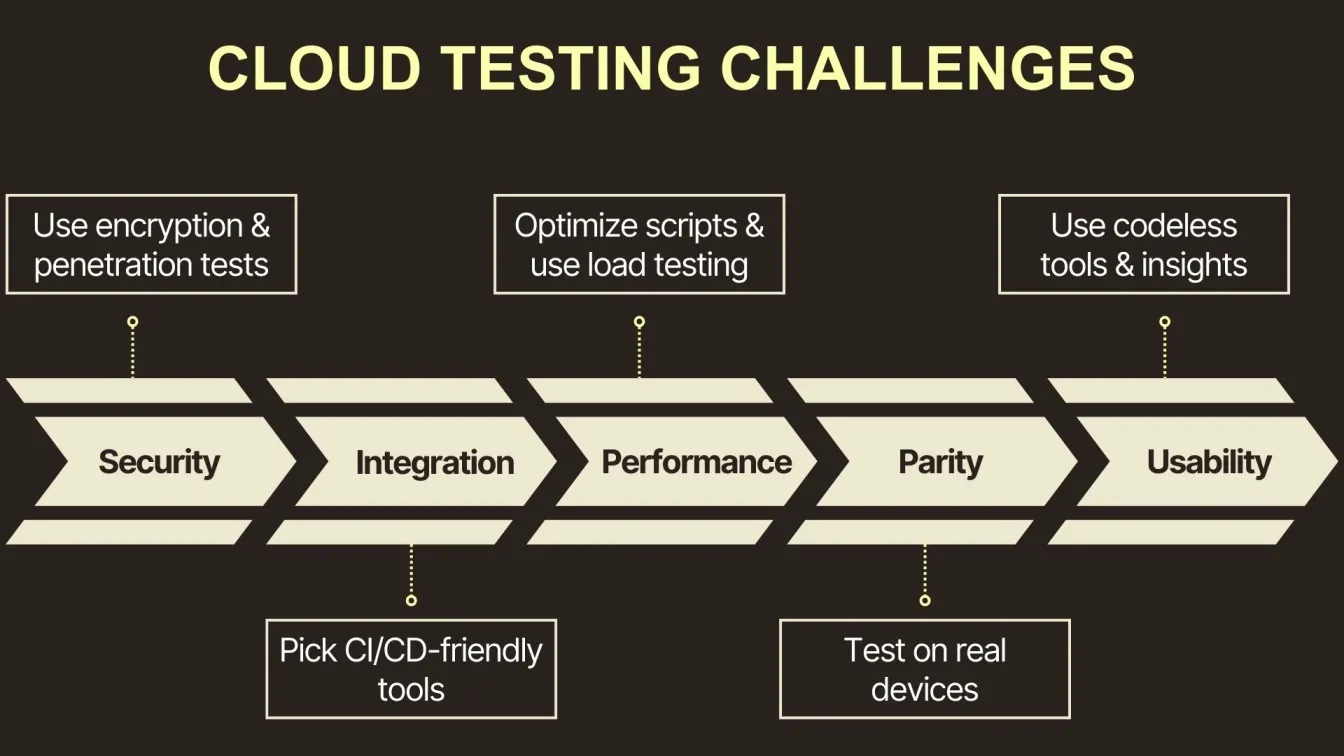
- Data Security & Compliance: Strong encryption and access control are essential for secure quality control software. Tools offering penetration testing and real-time testing help address risks.
- Tool Integration Issues: Incompatibility with existing CI/CD tools can slow progress. All-in-one test automation tools with Parameterized testing and comprehensive testing solutions.
- Performance Bottlenecks: Inefficient scripts or limited resources affect results. Use cloud-based automation testing with powerful data-driven testing capabilities and support for load testing to ensure optimal performance.
- Environment Parity: Mismatches with the production environment can cause bugs in the environment. Leverage real device cloud, manual testing methods, and suite reporting for accurate testing scenarios and seamless user experience.
- Testing Strategy & Usability: A strong testing strategy using codeless tools, Real-Time Insights, and efficient testing across a range of devices ensures usability, supports user acceptance testing, and resolves usability issues effectively.
Best Practices for Effective Cloud-Based Testing in SaaS
To get the most out of cloud-based testing, SaaS companies should follow proven strategies that improve reliability, speed, and overall quality. These best practices ensure robust software quality assurance services tailored for dynamic cloud environments.
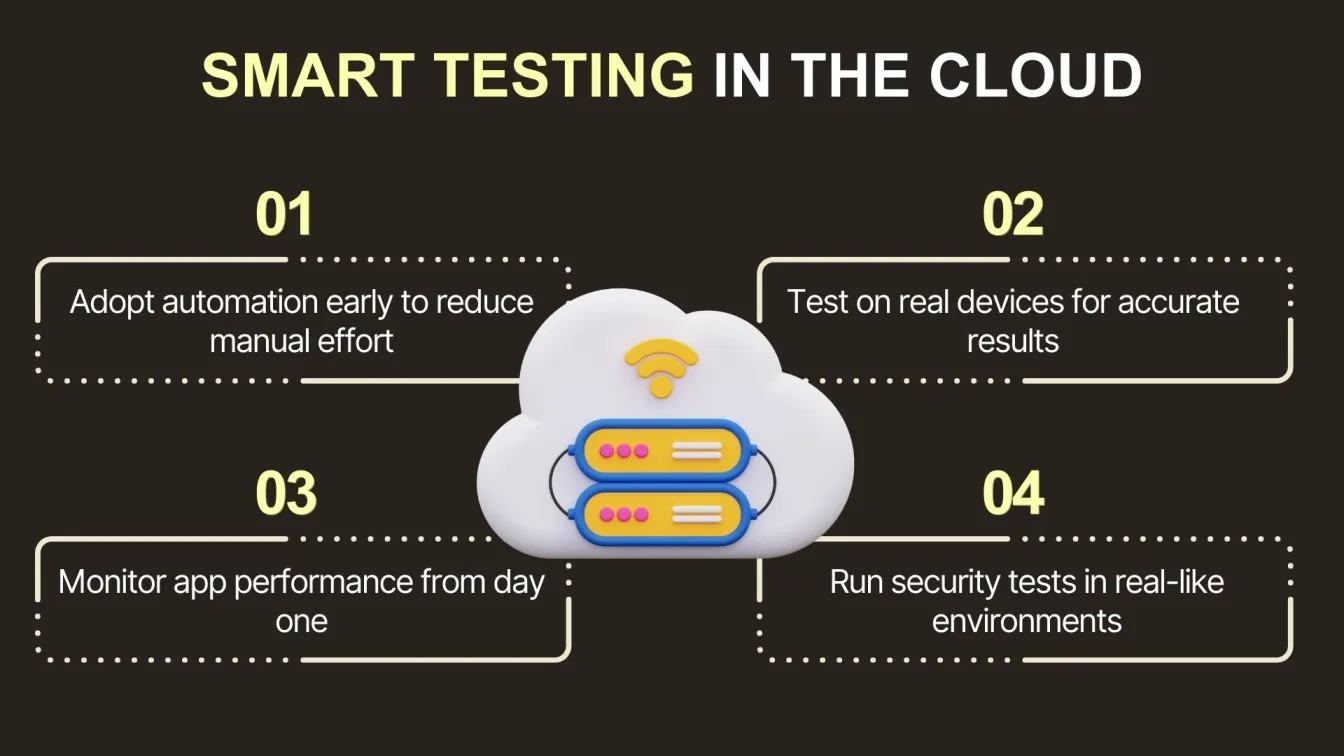
- Adopt Testing Automation Early: Implement testing automation from the start using a reliable test automation platform to streamline repetitive tasks and reduce manual effort.
- Test Across Real Devices & Browsers: Use cloud labs to validate performance and compatibility, ensuring consistent user experience with help from quality control software.
- Focus on Performance from Day One: Continuously run performance testing software to monitor app speed and scalability as part of your performance testing website strategy.
- Prioritize Security Testing: Use secure quality assurance software environments that reflect production conditions to catch vulnerabilities early.
Case Studies: Successful Cloud-Based Testing in Leading SaaS Companies
Below are real-world examples of SaaS companies that demonstrate how cloud testing empowers SaaS software companies to scale efficiently. These major SaaS companies have effectively used software quality assurance testing services, performance testing software, and test automation platforms to improve software reliability and speed. These are perfect examples of SaaS companies achieving success through modern testing practices.
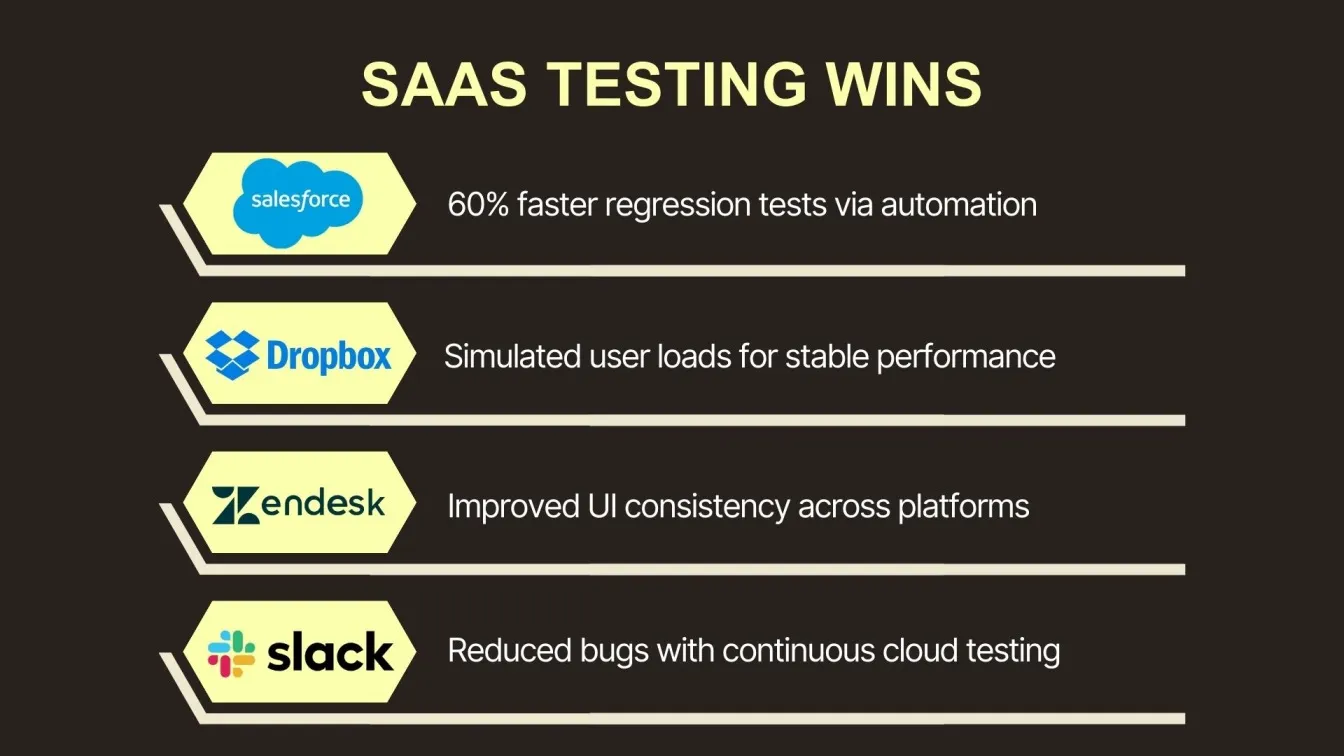
- Salesforce: A pioneer in cloud computing SaaS, Salesforce implemented robust testing automation and integrated software test automation into their CI/CD pipeline. This led to a 60% reduction in regression testing time and higher release consistency.
- Dropbox: Leveraged advanced performance testing software to simulate real-user behavior at scale. The result was a stable and high-performing performance testing website, ensuring seamless collaboration experiences.
- Zendesk: Integrated centralized quality assurance software and quality control software for cross-platform testing. This minimized interface inconsistencies and improved user satisfaction across multiple environments.
- Slack: Adopted cloud-based test automation services to enable continuous testing within their SaaS in cloud computing model, improving deployment speed and reducing production bugs.
Top Tools and Platforms for Cloud-Based Testing
With the rise of SaaS in cloud computing, selecting the right testing tools is essential for achieving faster releases and reliable performance. Many SaaS software companies and major SaaS companies rely on powerful tools that support software test automation, performance testing, and quality assurance software integration. Below are widely adopted platforms used by top teams today.
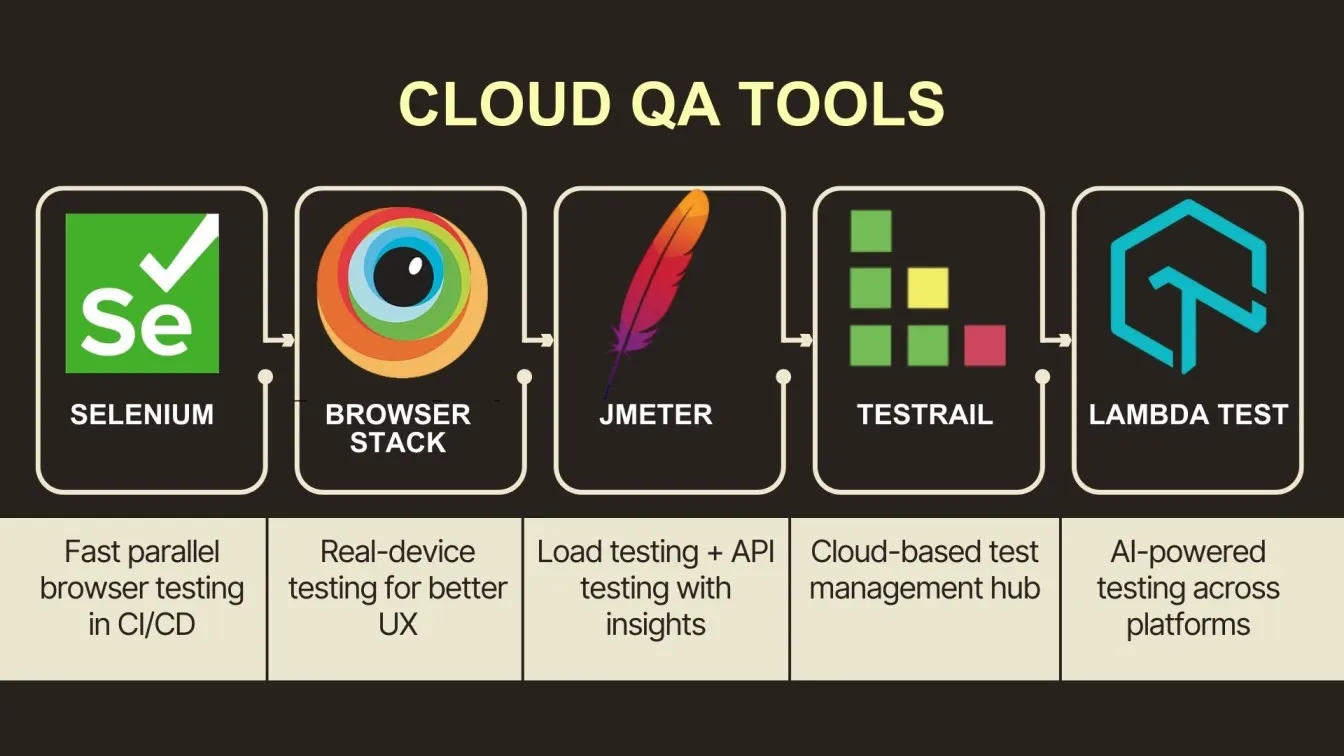
- Selenium Grid (Cloud-Based): A popular application testing tool for cloud-based automation testing. It allows parallel execution across multiple environments and supports browser-based tests. Ideal for CI/CD integration and running scripts for regression testing.
- BrowserStack: A leading test automation platform for cross-browser testing, offering a real device cloud and real browsers. It enables QA teams to test on a wide range of devices and browsers, ensuring a seamless user experience and addressing common testing challenges.
- JMeter (Cloud-integrated): A powerful performance testing tool used for load testing by examples of SaaS companies. It supports parameterized testing, and testing of APIs, and delivers real-time insights and extensive reporting, making it effective for identifying nuanced issues in production environments.
- TestRail (Cloud Edition): Acts as a central hub for managing testing activities, including user acceptance testing, planning, execution, and suite reporting. Offers robust test management capabilities and collaboration features for ensuring standards of quality across the testing process.
- LambdaTest: A comprehensive solution for manual and automated testing in the cloud. It supports mobile app testing, AI-powered test healing, dynamic data-driven test cases, and seamless integration with popular CI/CD tools. Its intuitive interface and suite of features make it a versatile choice for testing strategies and automation of regression tests.
Ensuring Security in Cloud-Based Testing Environments
Security is a top concern for SaaS software companies, especially in a cloud testing environment where sensitive data is handled throughout the development lifecycle. As SaaS in cloud computing expands, addressing security concerns, securing data, and ensuring application quality becomes critical. The following practices are essential:
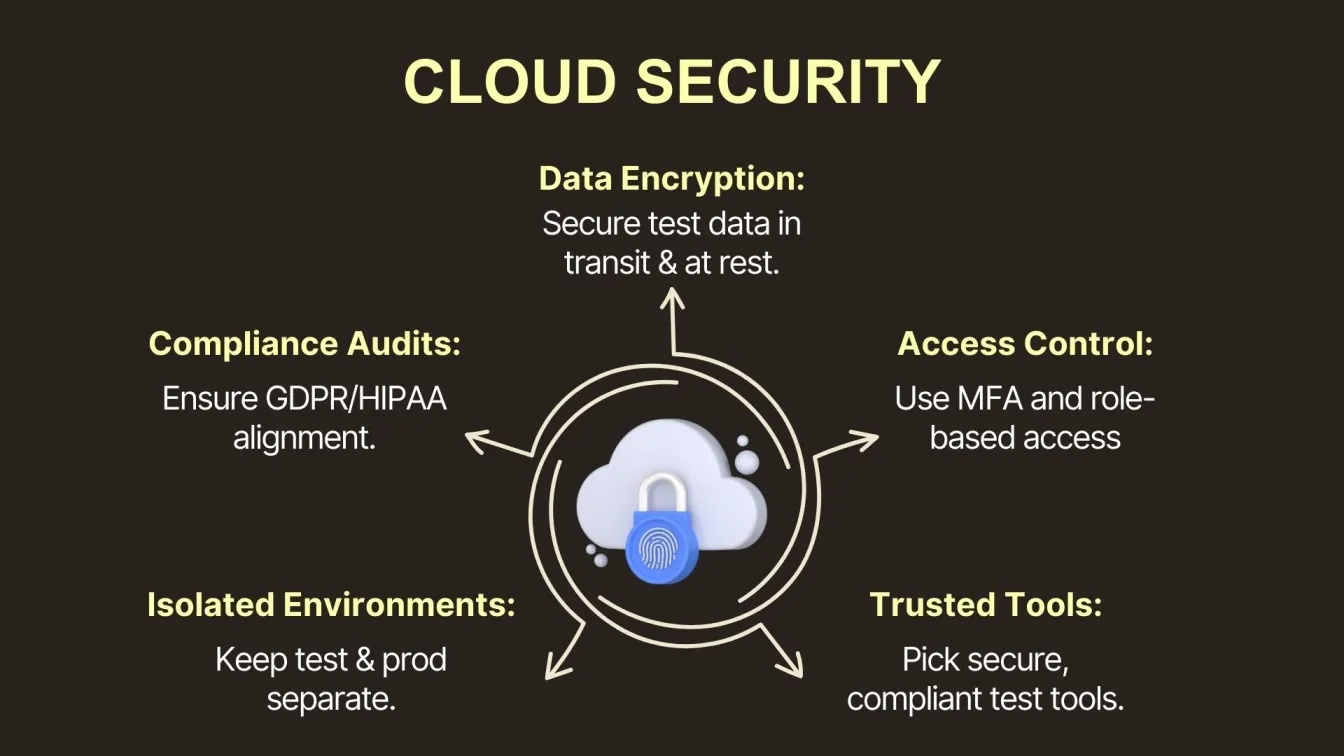
- Data Encryption: Encrypt all test data—both in transit and at rest—using strong protocols. This ensures that cloud-based automated testing and software quality assurance testing services don’t compromise sensitive user data.
- Access Control Measures: Leverage quality control software to enforce role-based access and multi-factor authentication, preventing unauthorized access to testing environments.
- Secure Testing Tools: Choose vetted automation testing tools, such as AWS Device Farm, which offer advanced features, support integration testing, and align with standards like SOC 2 and ISO 27001. These tools simulate real-world scenarios for mobile applications and web testing.
- Isolated Test Environments: Establish isolated cloud computing service environments for test execution. This avoids overlap with production and improves resource utilization and accuracy of tests in real-time.
- Compliance Auditing: Regular auditing helps ensure your testing processes and automation testing practices meet global compliance standards like GDPR and HIPAA. Such careful planning improves overall system integrity.
Performance Testing in Cloud-Based Setups
In cloud-based environments, performance testing is crucial for ensuring SaaS applications run efficiently under various loads. With advanced features and integration capabilities, SaaS software companies gain valuable insights into system behavior.
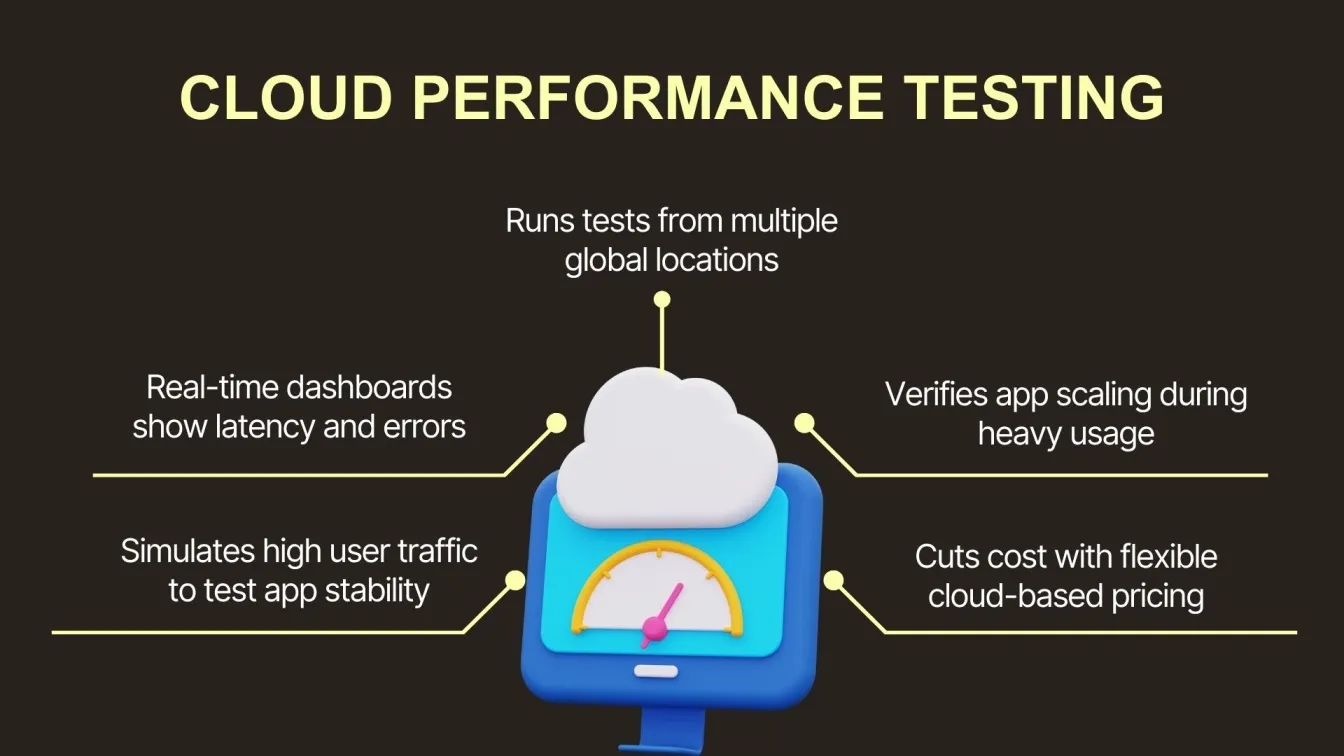
Key elements of cloud performance testing include:
- Scalable Load Simulation: Cloud tools simulate high traffic to help major SaaS companies validate system strength. Support for all skill levels and codeless automation simplifies the process.
- Real-Time Monitoring: Integrated dashboards provide detailed insights with metrics like latency and error rates, enabling faster test execution and quicker fixes.
- Auto-Scaling Validation: Examples of SaaS companies verify app scalability during high traffic, especially after frequent updates.
- Cost-Efficient Execution: With flexible cloud pricing and comprehensive reporting, teams optimize testing processes without major infrastructure costs.
Leveraging Automation in Cloud-Based Testing for SaaS
In cloud-based setups, integrating an all-in-one test automation tool into the development cycle helps SaaS software companies achieve a comprehensive solution for delivering quality at speed. This approach reduces manual testing efforts, supports efficient testing, and ensures consistent outcomes aligned with key testing objectives.
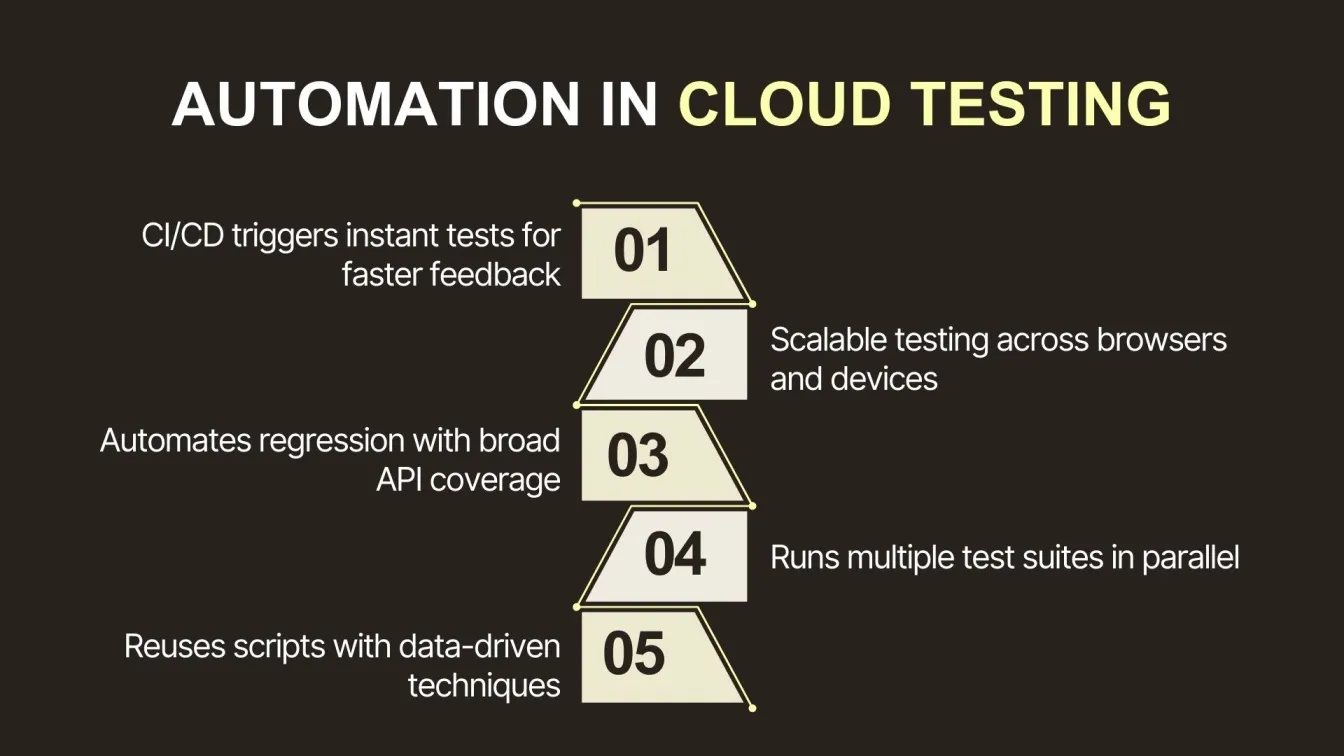
- Continuous Integration & Deployment (CI/CD): Automation ensures that every code change triggers instant test cycles using app test automationSuitable services. This enables Real-time reporting, faster feedback, and more stable releases—essential for meeting high standards of quality.
- Cross-Browser & Cross-Device Testing: Cloud-based platforms like BrowserStack and LambdaTest support browser testing imperative, enabling scalable testing across a wide range of devices and browsers. This helps deliver a reliable user experience and addresses usability issues effectively.
- Regression Testing: Repetitive test cases are optimized using APIsAutomated testing, allowing teams to align with dynamic demands and minimize manual effort. The use of Comprehensive API testing capabilitiesSupports ensures broader test coverage.
- Parallel Execution: Teams benefit from faster results with no compromise on accuracy by leveraging exploratory testing techniques and running multiple test suites in parallel—critical for modern testing strategies.
- Reusable Test Scripts: Scripts built using features from platforms like Micro Focus support parameterization and data-driven testing using APIsData-driven testing, minimizing redundancy and optimizing testing efforts across builds.
Cost Efficiency of Cloud-Based Testing Solutions
Cloud-based testing offers a flexible and cost-effective approach for SaaS software companies to maintain software quality without heavy infrastructure investments. By adopting test automation services through a comprehensive suite of tools, a range of features, and cross-browser capabilities that ensure consistent performance across different platforms. Here’s how major SaaS companies achieve cost efficiency:
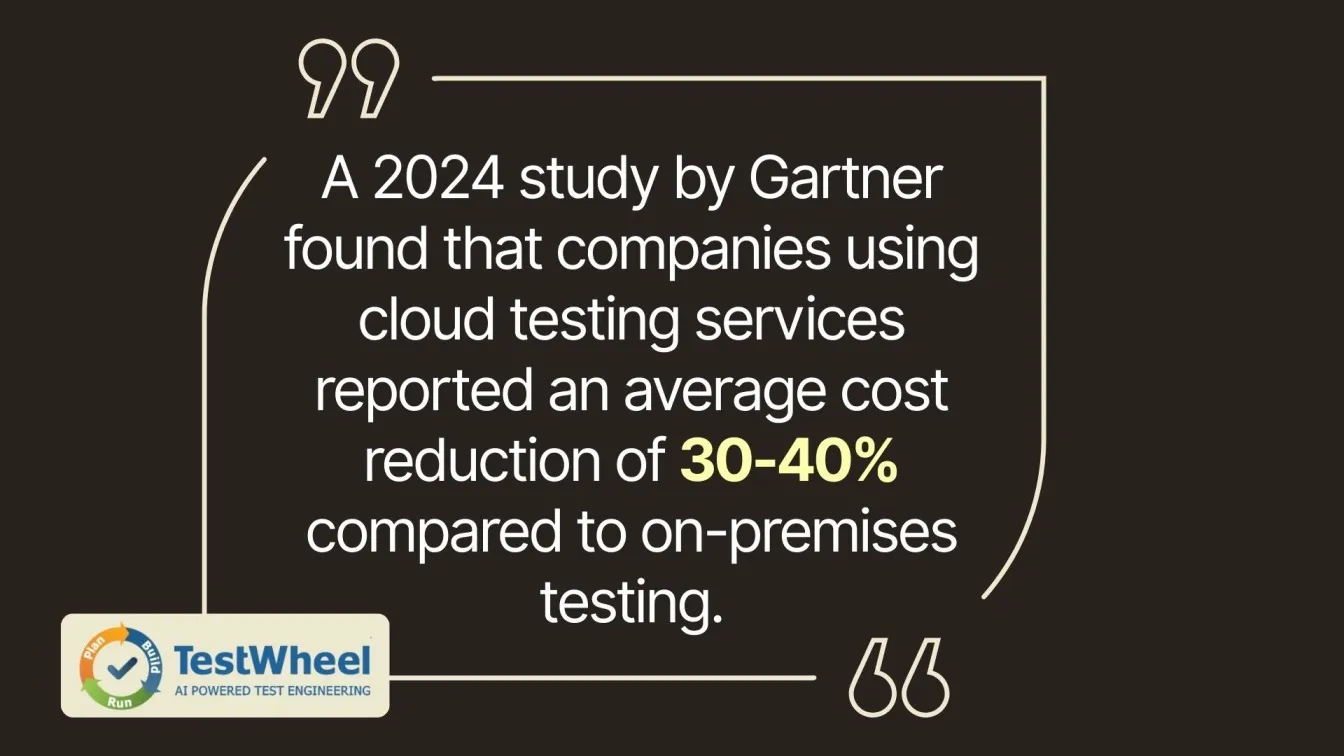
- Pay-as-You-Go Model: Cloud platforms charge based on usage, eliminating the need for expensive physical servers and saving operational costs for examples of SaaS companies.
- Minimal Maintenance: No on-premise hardware. Cloud testing tools and performance testing software are updated by providers, reducing Dependency on tool updates.
- Faster Time-to-Market: Automated test suites powered by test automation platforms accelerate testing cycles, reducing development time and cost.
- Shared Environments: Teams perform performance testing website checks in collaborative, scalable labs. Simplifies environment setup and boosts collaboration features.
Conclusion: The Impact of Cloud-Based Testing on SaaS
Cloud-based testing is set to become even more intelligent, agile, and scalable in the coming years. SaaS software companies are increasingly adopting AI-powered test healing and cloud-based automated testing, enabling predictive analysis and self-healing scripts on leading test automation platforms. These tools simplify repetitive testing tasks and help execute dynamic data-driven test cases for diverse testing scenarios across browser-based tests and cross-browser environments.
Modern platforms offer suite reporting, codeless tools, and a suite of features to address common testing challenges, reduce the need for specialized skills, and improve bug tracking. This shift not only ensures optimal performance and a friendly testing experience, but also delivers a comprehensive solution for complex testing - supporting unlimited tests and evolving how examples of SaaS companies approach testing in the era of SaaS in cloud computing.
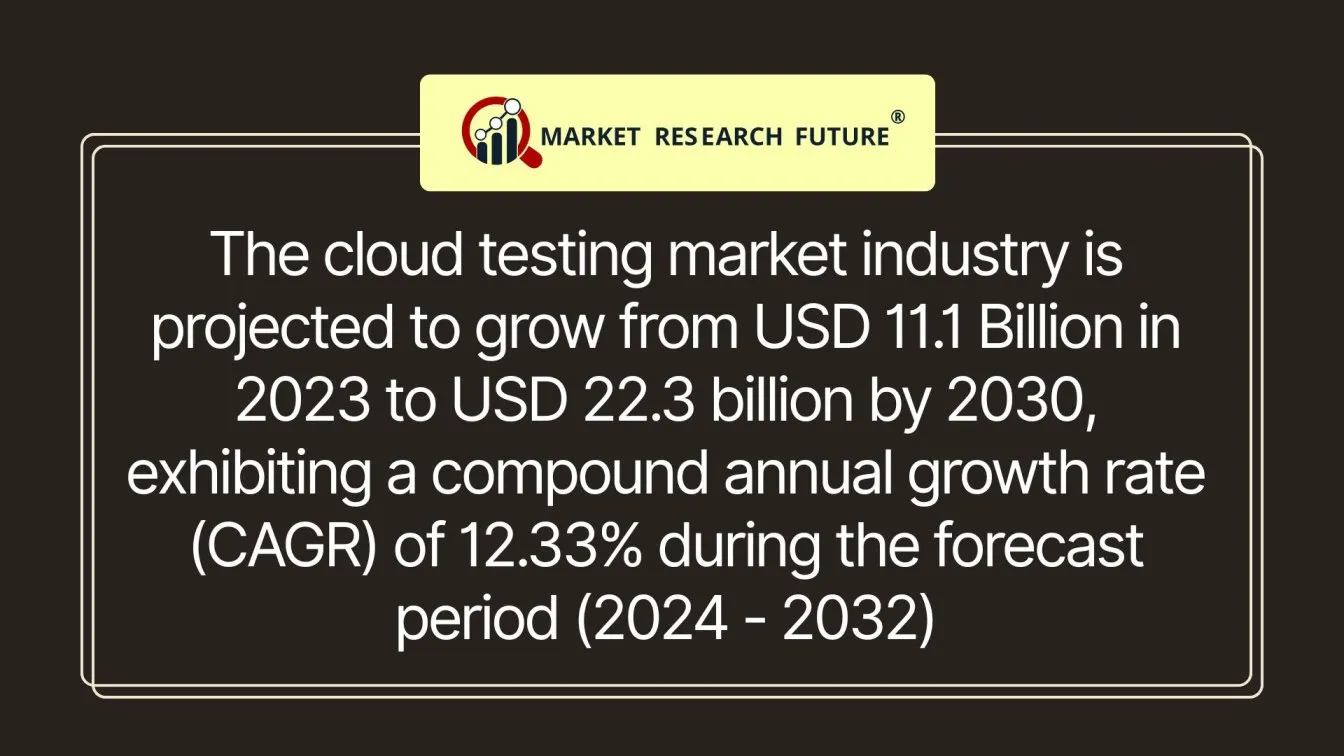
Frugal Testing Company is set to revolutionize software quality for SaaS providers through its comprehensive offerings. The services offered by Frugal Testing encompass a wide range of solutions tailored to meet diverse testing needs. Their functional testing service ensures that applications operate flawlessly, enhancing user satisfaction. With cloud-based test automation services, they provide scalable and efficient testing environments, reducing time-to-market. Additionally, their AI-driven test automation services leverage artificial intelligence to optimize testing processes, ensuring accuracy and efficiency. These integrated services empower SaaS companies to deliver robust and reliable software products.
People Also Ask
What is a cloud test strategy?
A cloud test strategy outlines the approach for testing applications using cloud resources, focusing on scalability, cost-effectiveness, and real-world simulation.
How does cloud-based testing impact release cycles for SaaS companies?
Cloud-based testing accelerates release cycles by enabling faster test execution, parallel testing, and real-time collaboration across teams.
What are the benefits of cloud analytics?
Cloud analytics offers benefits such as cost savings, scalability, accessibility, and enhanced collaboration.
What are the latency issues in cloud testing?
Latency issues involve delays in data transmission due to factors like geographic distance between users and servers, impacting application performance.
How does cloud testing support API testing?
Cloud testing provides scalable environments to simulate real-world API interactions, ensuring functionality, performance, and security under various conditions.



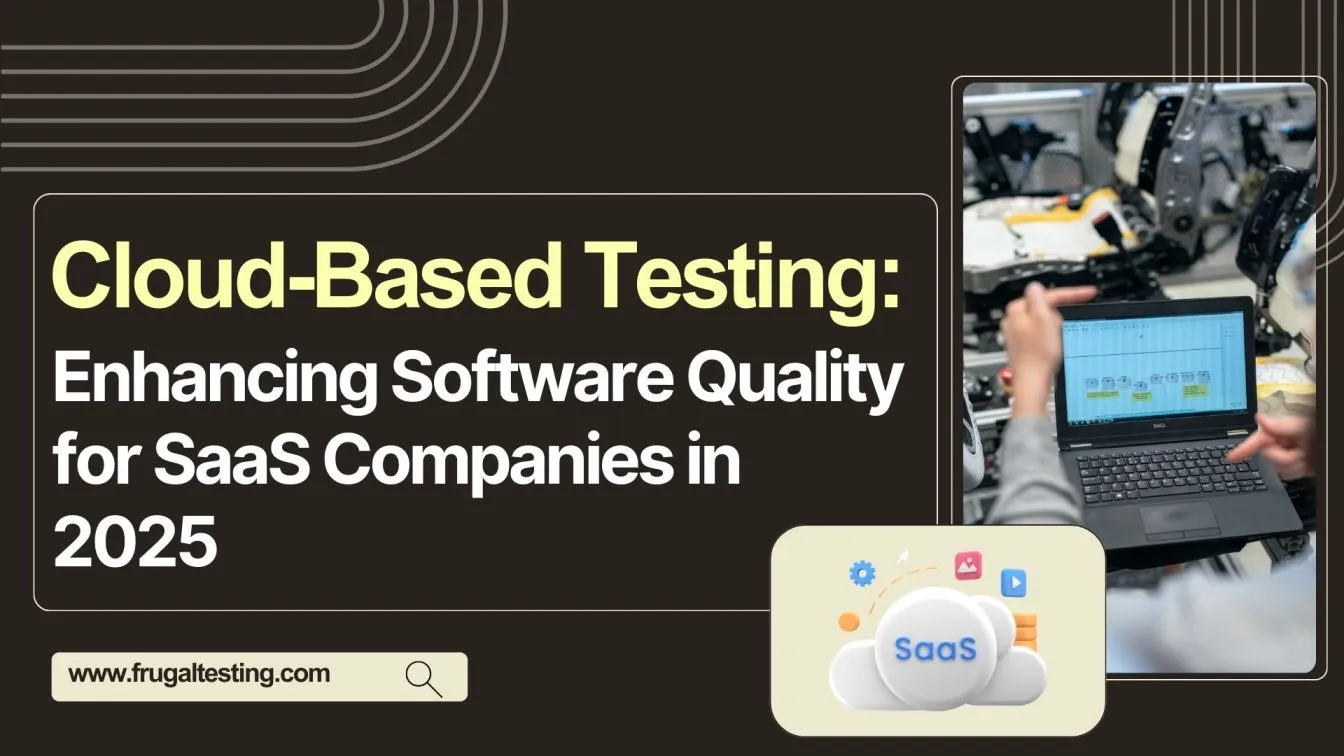

%201.webp)

